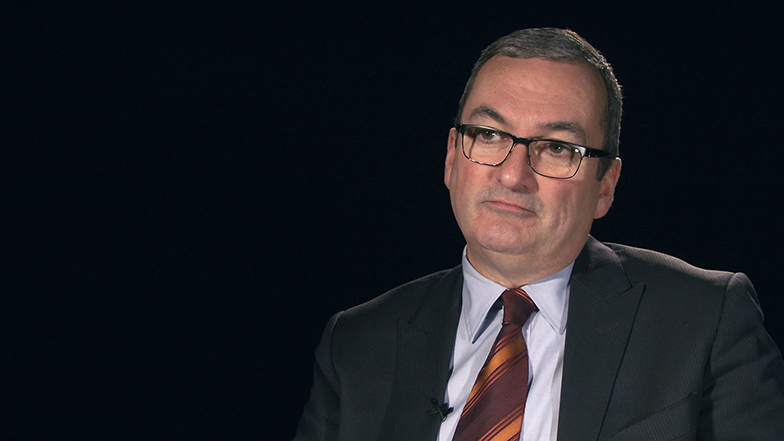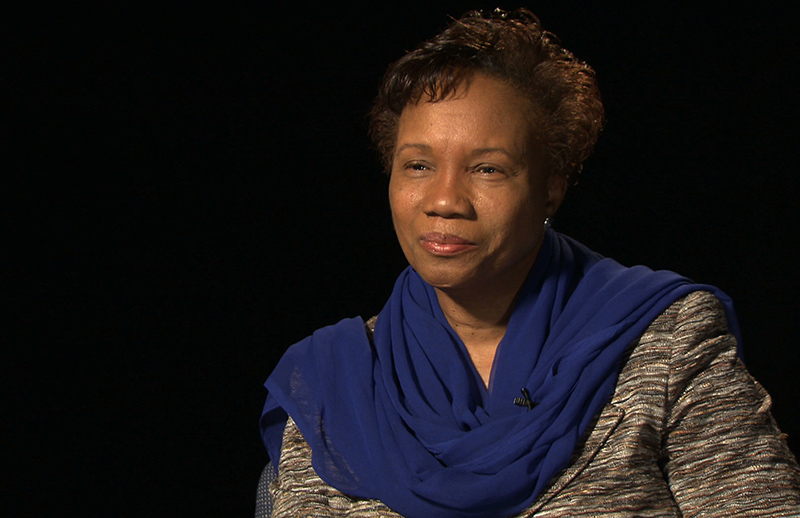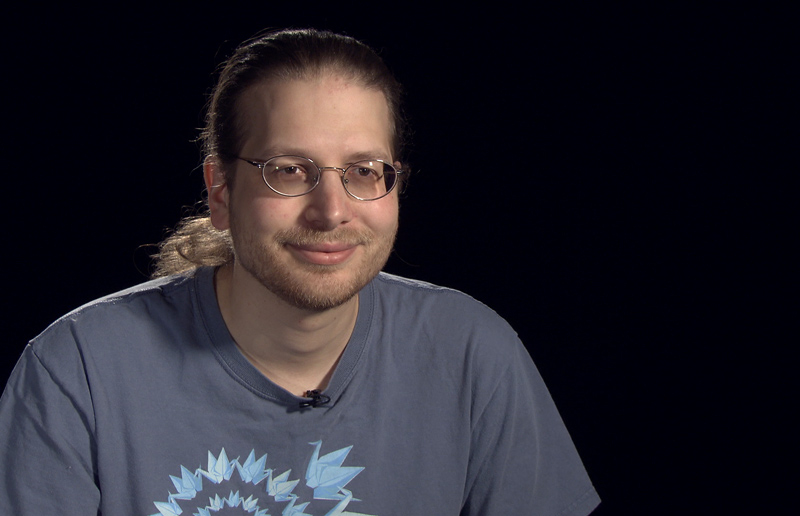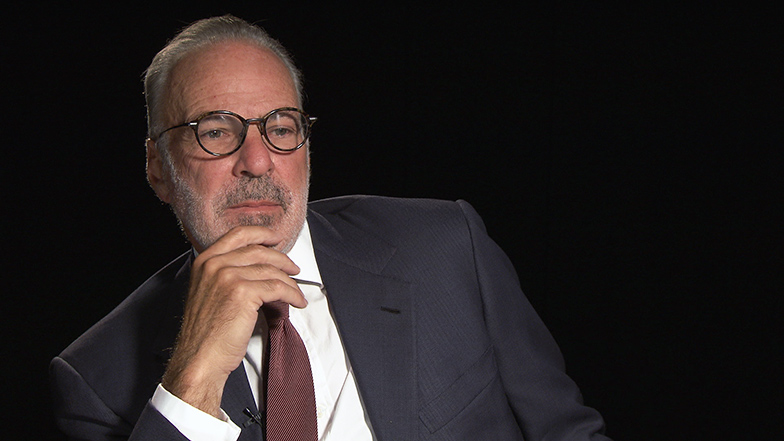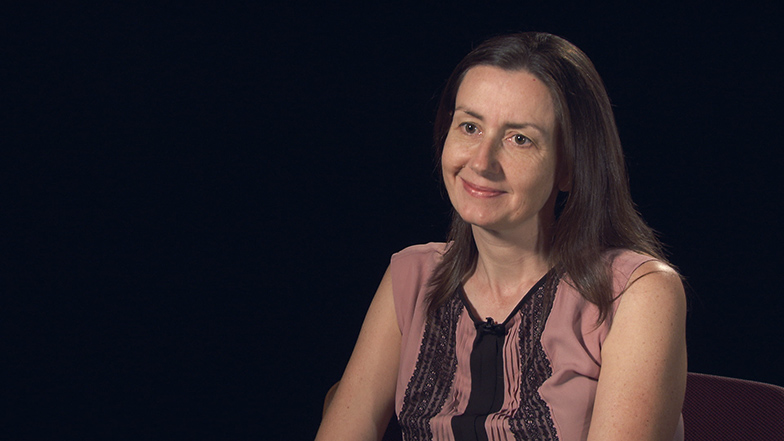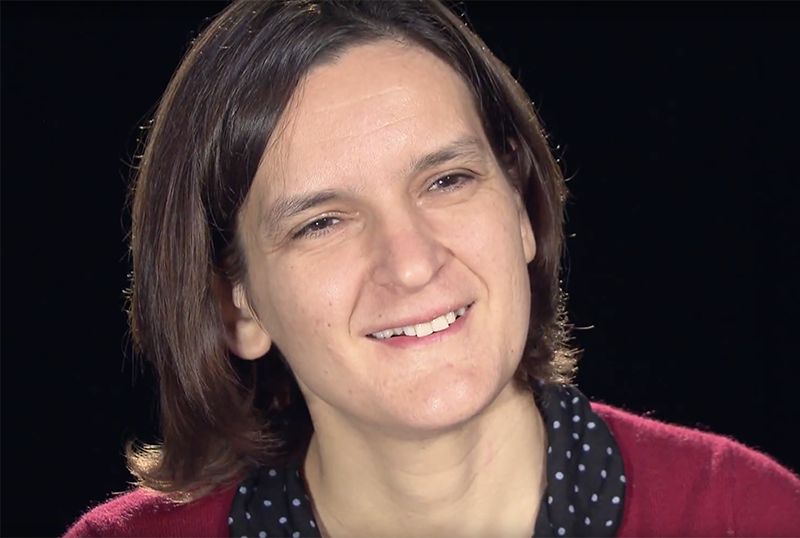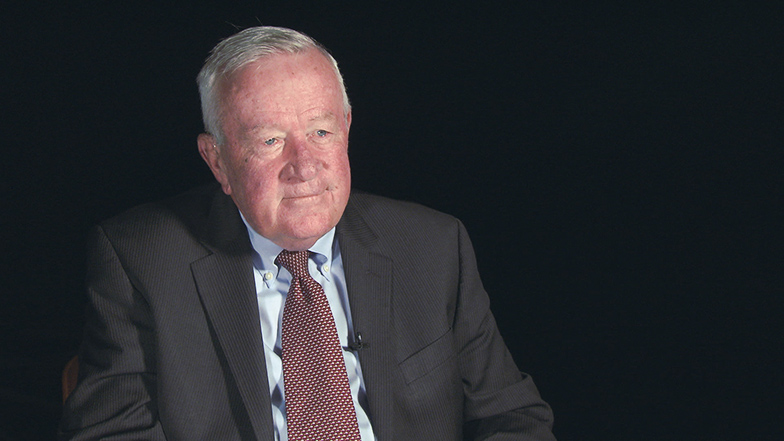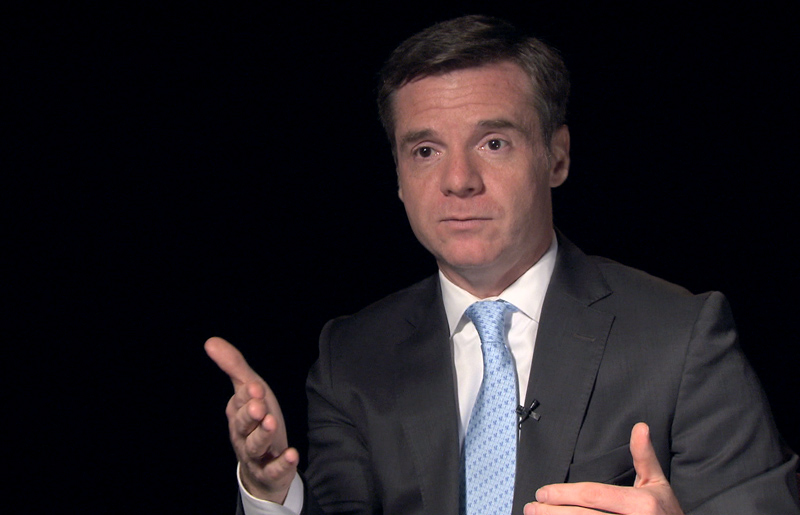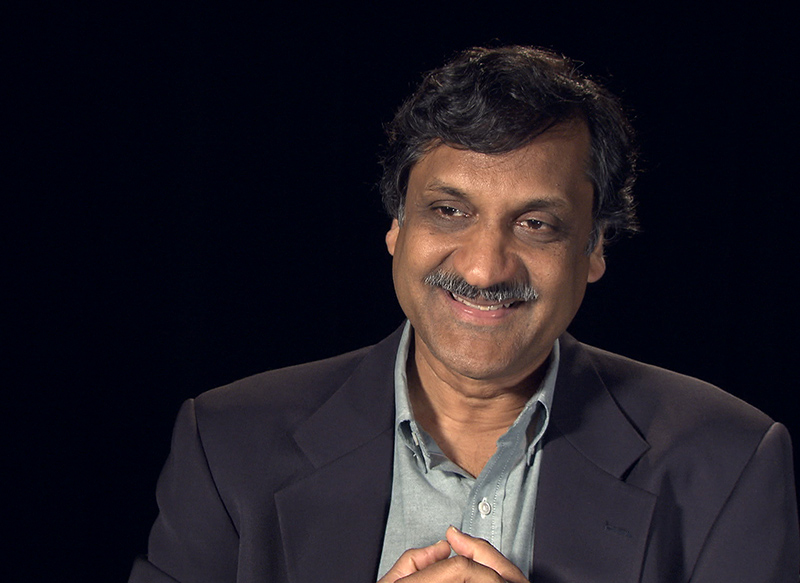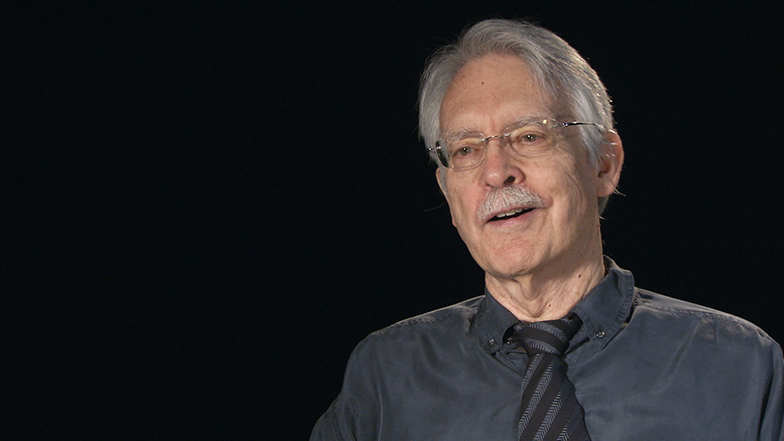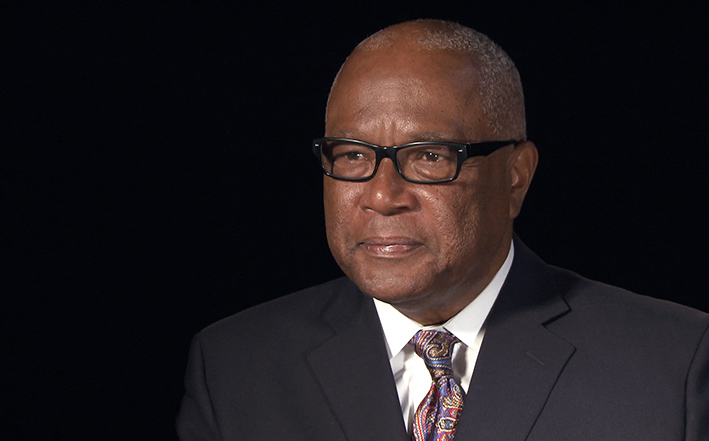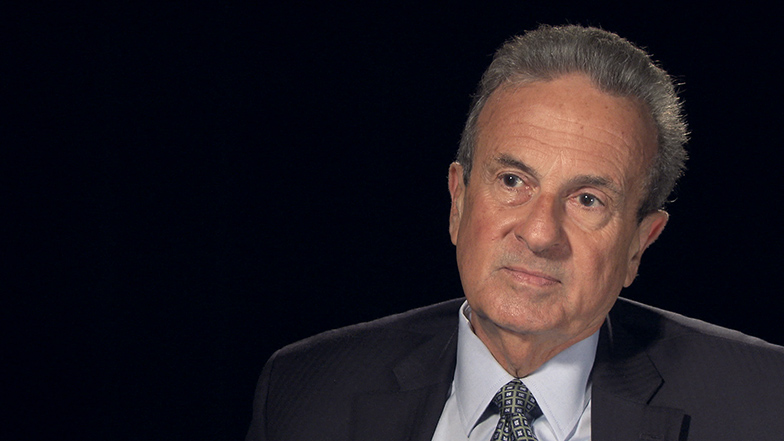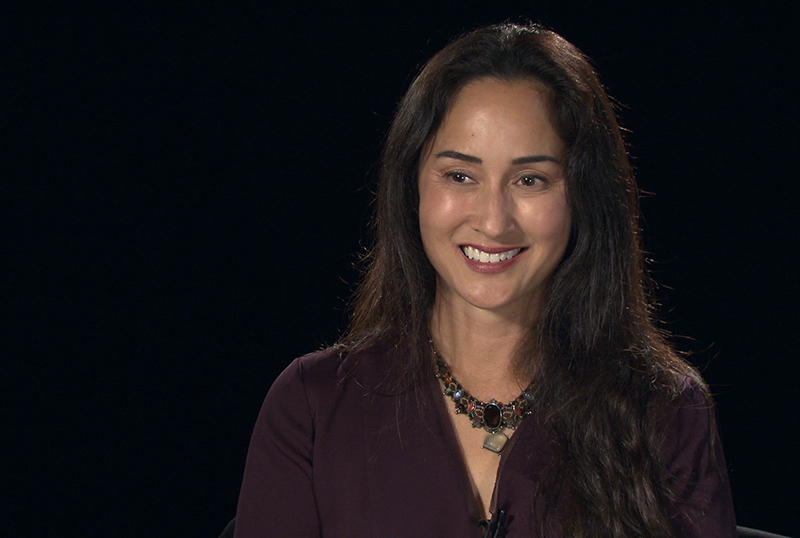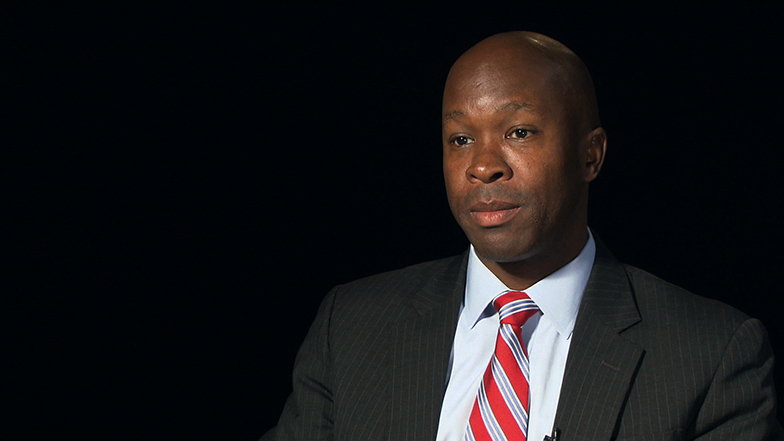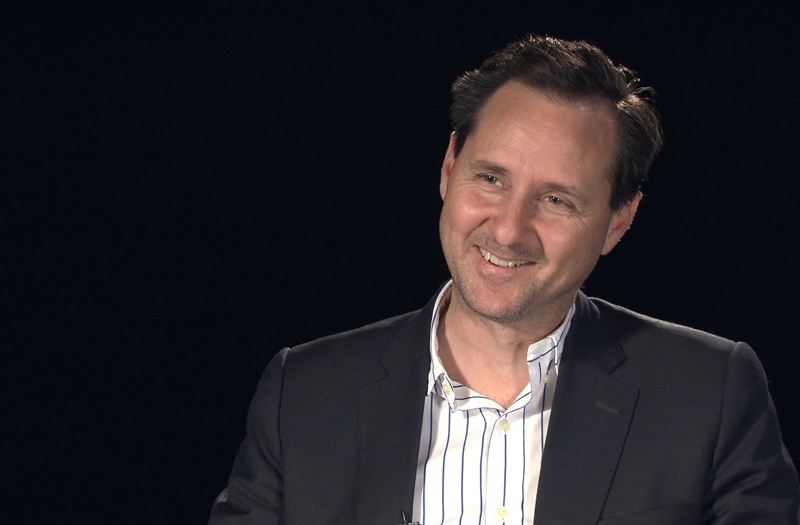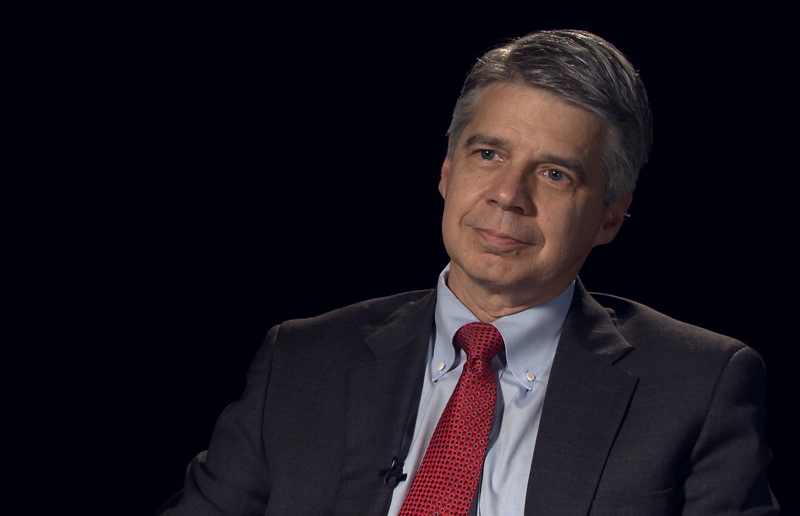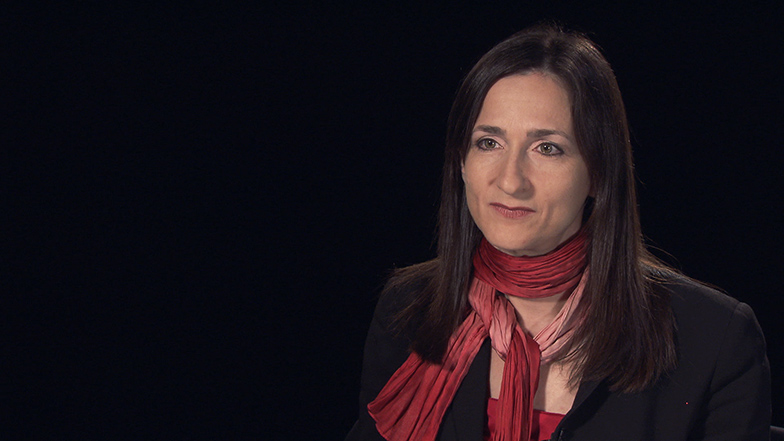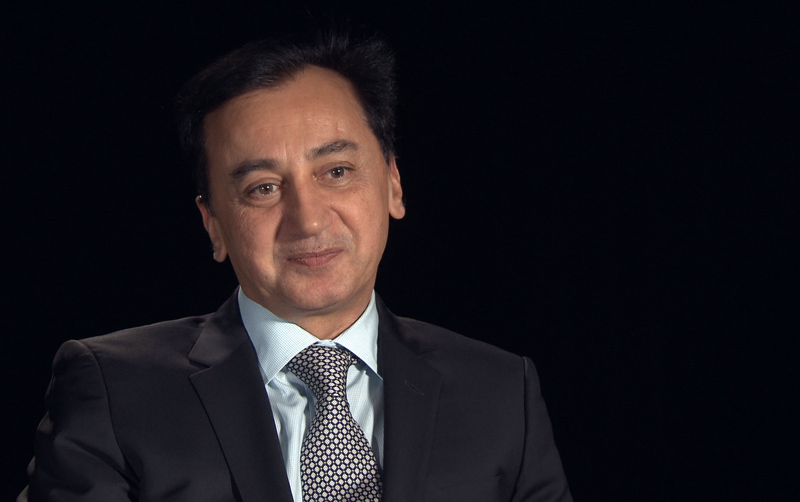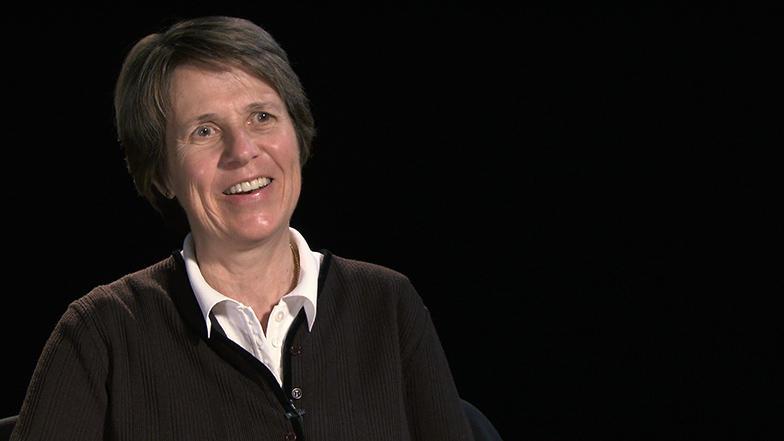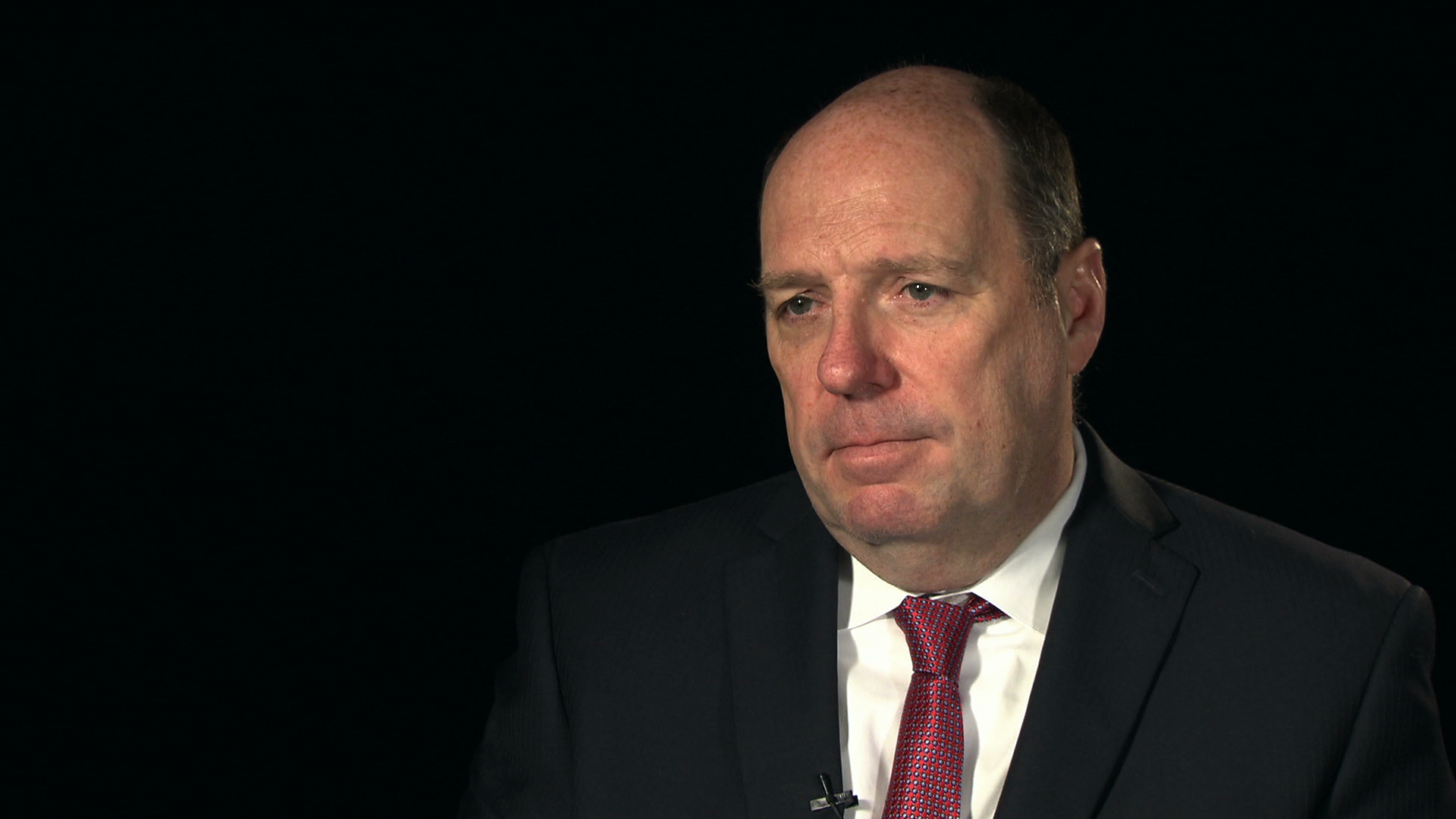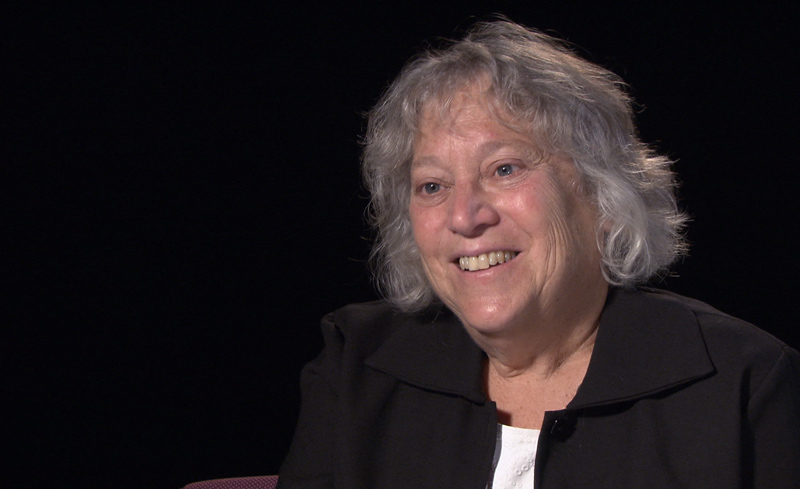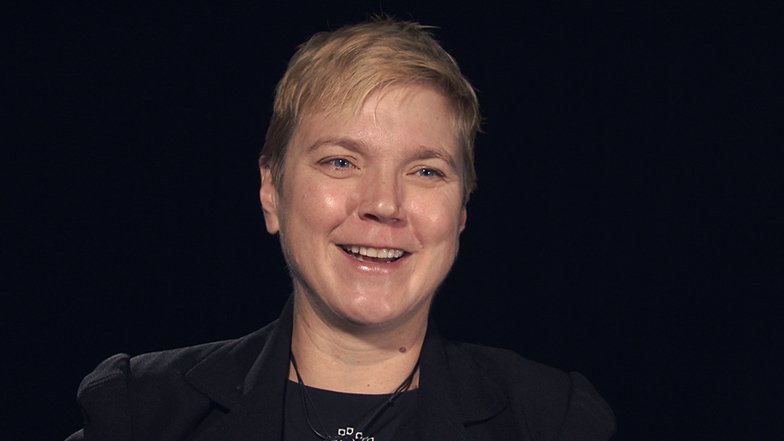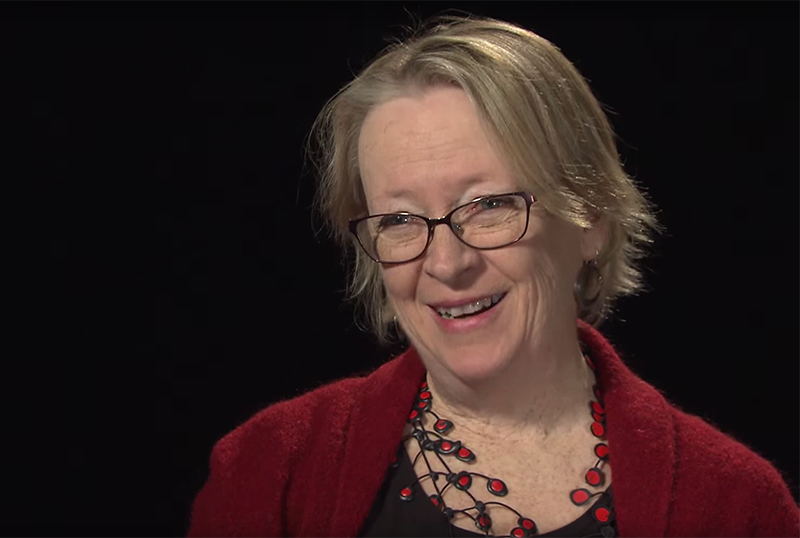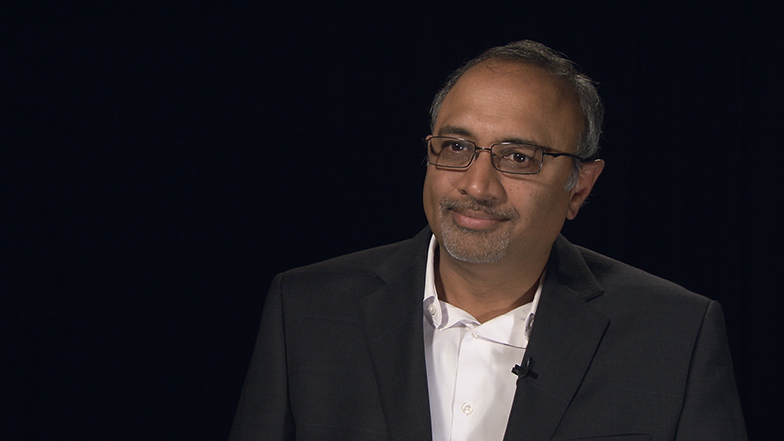Kenneth E. Reeves
INTERVIEWER: Today is Wednesday, November 18, 2015. I'm Joe McMaster. And as part of MIT's Infinite History Project, we're talking with Kenneth Reeves. Mr. Reeves served on the Cambridge City Council from 1990 to 2013 and was the city's mayor for three terms. He is currently a Dr. Martin Luther King, Jr., visiting scholar at MIT in the Department of Urban Studies and Planning.
Mr. Reeves was born in Detroit, Michigan, and first moved to Cambridge to attend Harvard University as an undergraduate. After working in private law practice in Detroit, Boston, and Cambridge, he was elected to the Cambridge City Council.
While serving in politics, he was an innovator around programs to enhance the quality of life in Cambridge. He's been an advocate for affordable housing and vibrant neighborhoods and business districts, including Central and Kendall Squares. And he's had an ongoing relationship with MIT for many years. Mr. Reeves received a Bachelor's degree in American history from Harvard University and a law degree from the University of Michigan Law School. Thank you for speaking with us, Mr. Reeves.
REEVES: Pleased to be here.
INTERVIEWER: Great. So maybe we can begin by talking about your current work here at MIT. You're a visiting scholar here.
REEVES: Well, I didn't know what to pray for. So this is a wonderful surprise, actually, to be invited to come to MIT and spend this year as a visiting scholar. Really, my portfolio is to sort of enrich this community in any way that I can. So figuring out ways is a pleasant venture, I'm going to say.
But its form, though, is that I'm teaching a seminar this semester called The Future of American Cities. And we've done some very interesting explorations of how the biotech and tech cluster here in Kendall Square came together and was able to take the class on a tour from Central Square through the housing projects over to McGovern and Pfizer and down Main and then down 2nd Street just to see how many different things have come together.
And it's interesting in a department of planning and architecture that so little of what is today Kendall Square was actually planned to be what it is. There've been a lot of serendipity and a lot of things having to do with the economy and history and politics all have combined to bring this cluster together, which the Boston Consulting Group was engaged by the Kendall Square association to come and look at Kendall and say, what did they see?
And they came back and said that Kendall Square in a square mile radius of Kendall is the most innovative square mile in the universe, was their words. So I'm not quoting myself. But I think it's a very special place that has emerged.
And I teach my final segment of the seminar this Friday, the 20th. And that is going to be about how to build housing for people who are not millionaires. So I've invited a number of developers to come and speak with the planning students, because very often folks with city planning background have never talked to a developer to know how they think or what their real bottom-line concerns are.
And I have worked with a couple generations of city planners who were more technical assistance. And I would suggest many elected people are not visionaries. So we need more visionaries to come from planning schools to help shape cities in new and exciting ways.
INTERVIEWER: So what is your take on how this area coalesced over the years. What do you tell your students?
REEVES: Well, it kind of begins in the funniest way on the city of Cambridge side. We have a wonderful former city counselor and mayor Al Vellucci, who was my mentor. He was a big idea guy. We'll call him that. Although he didn't graduate from high school until he was well up in his 60s. He went to Community Learning Center and got a GED.
But Al liked to be kind of a prankster and a chickster with Harvard and with MIT. So he would threaten at various times to pave over Harvard Square or Harvard Yard or, they should pay taxes. And he would have his own critique. And in that way, he exercised a fair amount of influence with Harvard particularly.
With MIT, he kind of got into this interesting question about, what exactly are they doing in all these labs, and particularly labs with animals. Are Petri dishes producing three-headed people? And that kind of thing. And, of course, the scientific community got a little concerned that nobody has really asked this.
But Al, in an attempt to answer his own question, he got involved with understanding about the National Institutes of Health and how much money they give for research and how much disproportionately MIT gets. And so I can't tell you exactly how he made this leap.
But he got the Cambridge city council to adopt the research standards produced by the National Institutes of Health. And this really gave scientists both here and from elsewhere the first place that they knew what the rules were. And this began to attract various researchers here and companies.
And then MIT literally has a very intimate relationship with the National Institutes of Health. And they-- I said before-- disproportionately receive funding that way. And, in fact, MIT determines how many graduate students it's going to have. And the science is largely based on what the research funding is from NIH.
And then that research often walks across the street to a for-profit company founded by the MIT professor who worked on the NIH grant. And it turns out that this is very much in the DNA of MIT. At Harvard, it would just be unthinkable prior to now-- Harvard has changed its thinking-- that you would mix for-profit science with pure side. Well, at MIT, that's been good always. And hence, it really is in the DNA here. And so that has caused so many different companies to be spun off from work done at MIT.
And then, of course, I told you before that I think it's a lot of a serendipity. We didn't invite Microsoft or Google to come. They just decided this is a place that they ought to be too. So this thing has organized itself in a very interesting set of ways.
And there's also what I call an aftermarket, which is more down the Central Square end of things, where you have companies like one California-based company, IDEO, where they have invented the mouse for the computer. So there are hardware engineering pieces. Or a company like Stryker, which is a company that makes the metal and composite new hips and knees-- a company like that. So it's science and bio-related. But it's more engineering centered, these things.
So those are some of the things that I went through on the tour. And used the example of the McGovern center for brain and cognitive sciences, is how the research on Alzheimer's and autism is getting so advanced that we feel that we're very close to breakthroughs in both of those.
So a Connecticut-based company, Pfizer, picked up the entire company and moved here, because they need to be close to the work that's going on at the McGovern. And you could say similar things about the work that's going on at the Koch Institute or at the Broad Institute. And certainly the Whitehead was the beginning prototype of those institutes. So we are in the center of a very interesting moment in the history of human beings. And a lot of the future is coming out of the buildings near to us.
INTERVIEWER: Yeah. I think that's something that's really-- does feel that way here to me.
REEVES: And it's exciting, I have to say that. And I do think that the city of Cambridge is culture which has large infusion of MIT and Harvard. But it's also got a kind of radical culture here that is "the people." And it seems to be they suit each other very well now. There used to be, during Al Vellucci's time, a lot of breakdown between town and gown.
I think after some very difficult soul searching between the city and MIT in recent years, that I had a lot of involvement with. I think we're in the best place we have ever been, because we've finally understood how integral we are with each other and that we need to understand the needs of each other and work together to achieve solutions that are really win-win.
INTERVIEWER: So I mean, a lot of this does go back to Mayor Vellucci, it sounds like you're saying.
REEVES: Well, yeah. There was an important new beginning, because it also happened at a time when President Kennedy had planned to put a NASA science research, space research center in Kendall Square. And so they urban-renewed about 30 acres. And they were just about ready to begin that process, when lo and behold, he's assassinated. And the new president, Lyndon Johnson, says, well, there will be a new NASA space center. But it's going to be in Houston.
So suddenly we have this 30 acres that have been cleared and not a particular plan. And it wasn't until Governor Volpe was able to get the federal government interested in a transportation center there-- and it's never been quite clear what that transportation center was really. It didn't seem to cook anything too hot or not--
It's some of the beginnings of the systems research about how highways and subways and buses-- just the beginning of transportation science seems to have had some good underpinnings there. But today, much of that building is rented to other concerns. It's not been a big hot spot.
But then the Cambridge Redevelopment Authority was created. And they named Boston Properties to be their master plan and developer. And that's how the buildings, which are the Marriott and the several buildings that include where Google is now and one of the places that Microsoft is. And also a center for venture capitalists is in that grouping, all way down to Legal Sea Foods.
And that was the beginning. And the rest of what you see there has emerged in a kind of as-needed and demanded way. The desire for lab spacing, Kendall Square, has gone through the roofs. And so a number of these real estate investment trusts, of which Boston properties is one, or Alexandria's another, BioMed Realty Trust. They have all come to buy land and build labs that rent for top dollar, something like $73 a square foot now is the top.
And it's been very lucrative. And then just Novartis, a Swiss-based company shows up. And it decides that it wants to first rent a large factory. And then it buys that factory. And then it adds to that factory. And then it negotiates a land lease with MIT for 20 acres. In about a month, we're going to be attending the ribbon cutting for three buildings on that site. One on Mass Ave is a Maya Lin building.
So this has all emerged. And then MIT had a big role. And it took about 30 acres, where Forest City invited an RFP and Forest City, a Cincinnati-based company won the right to develop that parcel. And so 30 acres. They have a long land lease, of which we're getting near to maybe 30 years of lapsing. I think the lease is about 75 years. I don't think it's 99.
But they came and built six or seven new buildings, plus a hotel, plus a grocery store. And it's been very successful from one point of view, because certainly Forest City has to pay MIT a portion of what it collects. But it collects quite a bit.
When MIT negotiated its portion, the economy wasn't so good. So they got less. Now Forest City gets the lion's share of what they are able to raise there, and the city gets taxes. The only question is, here you have a wonderful area of the city that people don't go to. It's got a big private park-- well, a big public park. But it's just not utilized in the way that you would ideally want to have a city that people who weren't in the factory could go near the factory, as it were.
So much of the politics of now has had to do in Kendall with MIT wanting to build five or six new buildings and there being, I think, some healthy concern that, given what happened with University Park and Forest City, let the city work with you as best we can to see if we can't get a place that does all the things that are part of your mission. But also, our mission is to have a livable city that is enjoyable for all the citizens too.
So at this time, I was working on a study of actually Central Square. I had put in the council order asking the city manager to-- it basically says, we have a lot of proposals cooking in Kendall and more to come in Central. And we don't really have a vision that we're pushing for either. Maybe if we could say more about what we wanted, we could shape this better.
And because we were kind of in Kendall, Alexandria came and said, well, we bought all these one-story buildings. We want to build nine stories. And we would say, well, why don't you build five stories. But it wasn't planning. We hadn't had a vision for that at all. So it was a little bit scary to me. Now, amongst my colleagues-- God bless them-- it was not an issue, you know? We could have gone the "I want 10, you get 5" route for the rest of time, I think.
So the manager-- and this is how things don't happen according to plan. When I put in that council order, what I meant was hire a consultant for Kendall and a different consultant for Central. His interpretation was, he hired the same company for both.
So it's come to be called Goody Clancy, and they are a well-known development firm. And so they came. But I had also negotiated with the mayor to have a special commission look at Central Square. And that was called the Mayor's Red Ribbon Commission on the Delights and Concerns of Central Square. Because Central has a kind of happening quality, I guess you would call it.
We wanted to see if we could curate a kind of more manageable "let's let everybody enjoy this together," as opposed to what sometimes can be seen as almost an occupation by folks who don't necessarily even live here.
So all of that being said, the discussions sort of-- Goody Clancy did Kendall first, because we were working on the Mayor's Red Ribbon in Central. And they had charrettes and many discussions. And they came back and said, well, if these are the 10 things you said you wanted in Kendall, in order to get them, you need about 4,000 more units of housing. In Kendall, you have a density problem. Nobody lives there. It's dead at night. You say there's no drug store there. There's no this. You need this greater population to have those things.
Well, they were the first persons in a long time who ever told Cambridge government and Cambridge people that you need to be more dense, because people here like to discuss open space, open spaces, king and queen, but that you need more people for density.
And then they did a similar charrette after receiving the center square study that I sort of quarterbacked. And they said, well, you would like these things. So what you need is about 1,000 to 2,000 more units in Central for more density to support more amenities of the types that you want-- a farmer's market, you want this, you want that.
So these things kind of happened in real time, and it was some of the first visioning. So along comes a developer in Central who buys up literally 14 parcels owned by one owner at the Quest site. Quest is a company where your doctor can test your blood and put it in something. And they send it to Quest, and Quest sends back the lab results. And they do that for everybody and hospitals-- very successful company. So they decided to move.
And the owner of the buildings, who was the founder of the company-- he had sold a business. But they were still in his businesses, his buildings. So he decided he would sell the buildings, because it was some new onerous tax treatment was coming. So they decided just willy-nilly it had to be sold before December 31 of a given year so that they wouldn't have a tax disadvantage. And a company that has some local involvement, Twining and Normandy, they bought the parcels. And they began talking about, well, maybe we'd like to build a hotel and a plaza here.
And as part of the Goody Clancy in Central, they also said, well, we've taken a look at the area between Main Street down to City Hall and a block back from Mass Ave on both sides. And we have found that you have 20 parking lots. And we don't know who owns them. We just know they exist. And we think that they are not at the highest and best use. For some reason, surface-level parking has been demonized now. Just some things are not a good thing. Encourages more cars, keeps the heats not green-- all those things.
So they said, these represent development opportunities for multi-story housing in Central. You should look at this idea. And by the way, this city of Cambridge owns a number of them. So when Normandy and Twining show up, there is a city lot right next to them on the Bishop Allen Drive. And they want to know, well, maybe we could make a hotel in this city and we could do more housing.
So this takes you up to about 2013. Now, unfortunately, I got so involved in trying to help shape the city, I didn't really see this wind of citizen unrest that kind of had the tune like, I live on Columbia Street. I just need to walk up the street, get some milk and bread, and go home. I'm not bio. I'm not tech. I just want to recognize my neighborhood.
And this became a true undertow. So a point of view, particularly in Central Square, in the Area 4 neighborhood, and to some extent in the Cambridgeport neighborhood, we don't want any more change. This is all too much. And it doesn't seem, at the end of the day, it's for us.
Well, it seems to me, in nature, change is always occurring. And I'd never seen any movement to stop any more change. And I've always been of the belief and considered belief that you cannot like the developers. But if they own the land and you want to impact somehow what's coming, other than through zoning, you probably should get to know a little more about how they think and what they think, and tell them what you think.
And so that tended to be too reasonable, I think. But what happened is, after 24 years and 12 terms, my 13th run, I was not successful. And I could spend a long time talking about the reasons why. But fundamentally, I kind of was there through a very long era. But that era was really ending. And the people who sent me, who were largely rent control tenants, who were all gone since 1995-- in fact, when I first ran, 70% of the voters were tenants.
Well, after rent control ended in 1995, virtually every triple decker in the city became three condominiums, and every building became 25 condominiums-- all with owners, all with a different set of concerns. So that's a lot to put together. A lot of moving pieces there.
But the city had changed a lot. And in the last election that I wasn't successful in, there came this new vitriol about anything development-wise. And this sort of culminated in 2014-- no, 2015 in the summer, June, when there was a proposal in Central Square to build a 195-foot tall housing development with retail on the first floor.
And I, who, in this council term, my view has always been, if you're not elected, then get off the stage. But I had to come back for a minute to just say, this is a very big building. And I want to know what did the people get for this. And the answer from the developer was that, well, there's going to be 47 units of affordable housing. And I just wasn't sure that that was enough, given the enormity of that tower in place that is called Mass+Main.
So we also did a unit on this in my seminar, where we brought in some representatives of the people who wanted the building and neighborhood people who did not want it. And it was an interesting class, because I almost had to break up a civil incivility. But it was exciting, I hope, for the students to just see how vehement people can-- how vehemently people can express their thoughts and concerns about development issues and zoning, et cetera.
So all of this is-- you realize too that Kendall and Central are integral to MIT. And then, in all of this, we also learned that MIT has its own real estate investment trust, which is called MITIMCo. And MITIMCo is managing about a billion and a half dollars' worth of real estate, half of which is in Central Square.
And by the time President Reif was sworn in, I would say, we were ready to rock and roll. And he put together a great team. And we finally said, you want to do a lot in Kendall Square. So bring the president and the provost and the significant decision makers to City Hall, and let us talk about what it is you want to do.
And they came. And they did a wonderful job of saying, we want to get this right. And whatever it was before, we want to get over that hump. And come to now, here's what we want to get done. And the council was very good at requiring this and requiring that. But their proposal went better than they ever imagined it could have.
So I can account for my time on the council. And I feel that the impending developments in Kendall and some of the actual ones in Central-- because that report on Central was such a real effort to look into the soul of Central and realize that it is many things-- as a religious center, as a center of government. It's a social services center. It's an entertainment center. A lot going on there. And lab report concluded that this is the Mayor's Red Ribbon on the Delights and Concerns of Central Square.
Many cities would pay to have active, vibrant streetscapes like you have. But it has to be curated. And maybe you want to consider having, what they call, a bid, which is a district which the building owners pay more for more services that, if they get one pickup now, they might want to get a company to do a second one for cleanliness. And it's called business improvement district, is the bid.
And turns out, New York City has about 240 business improvement districts. The only place here that has one is downtown Boston. Although, the truth is that the Forest City development at University Park has its own private security and many of the same things that a bid would have.
But in Central Square, in my opinion, it will never improve until the owners of the real estate, of which MIT is a major one, agree to have a bid that puts more services and more cleaning power in that square.
INTERVIEWER: Complicated story.
REEVES: I hope it makes sense.
INTERVIEWER: It is. I don't mean-- no, you're telling them. It is wonderful. I just mean, there's so many moving pieces, as you said.
REEVES: Well, there's a wonderful book called Times Square Roulette, which is about the many forces that combine to make change over a 40-year period in Times Square. And I call that book, what it's about, and my course "How the Sausage is Made" or, better, "How to Get the Sausage That You Want to Be Made."
So there's a lot of pieces, and they aren't just planning. I didn't say much about planning in what we talked about, because a lot happens just because it has to happen. So this one bought the building now and has a proposal now. It's not waiting on the plan.
And so it's funny in this moment, in 2015, the first thing Mayor Walsh does in Boston after 20 years of Mayor Menino, he says, we haven't had a plan here for, lo, these many years. Let's have a citywide plan. Then the Cambridge City Council elects two new people who came because we don't have a plan.
So now Cambridge is going to have a plan. Even Somerville now has to have a plan. So we're in the era of having a plan. But I will say that my experience in 24 years in government is that it's new candidate 101 to say you need to plan this. Well, obvious.
What you find out-- and I did participate in citywide rezoning while I was elected-- there was three areas of the city we could not agree on. So we decided to pass zoning everywhere else and then take those three areas one at a time and see what could we do.
And the third area, which is the Alewife area, we never got too good enough. And lo and behold, the big issue in the last election is the people who live up by Alewife just feel that there has been rampant development without planning and no parks. The roadways, just traffic jams-- it's a nightmare. So that was a big part of the discussion in this last election. And it really caused at least one person to get elected and one not to be elected.
INTERVIEWER: Interesting, yeah. Yeah. Well, switching gears a little bit, I'd love to ask you about your background. I mean, as we mentioned in the beginning, you grew up in Detroit. Maybe you could tell us about that and where you went to school and how you got to Cambridge.
REEVES: Oh, God.
INTERVIEWER: [CHUCKLES]
REEVES: Well, I grew up in Detroit. But along with that is that my parents are Jamaican and first-generation immigrants. And my mother was a registered nurse, and my dad worked for the Greyhound company. So my parents were divorced when I was one.
So much of my growing up was with a single parent. And I have an older brother, three years older, and a very industrious, wonderful mother, I will say that. And her goal was to get her sons to be able to take their places in life. And anything that was going to aid that, she was with that.
So I went to public elementary school, a school called Thirkell, that I walked to and quite loved. I loved my kindergarten classroom, and I just enjoyed school. Had some very dedicated teachers, the teachers of that time that I had.
And distinct from here, I had many black teachers too. But they were really trying to prepare us for the challenges of the country and, I guess, the world and life, but in a very personal way. And it was almost like surrogate parenting too. They were interested in character issues as well as academic issues.
And I went to a junior high, an intercity junior high, where I didn't love that, because junior high is kind of zooey. And I was a more arts kid. And a lot of shaking down and fights and stuff. And I thought, this is not fun.
But then I got to go to an exam high school, our equivalent of Boston Latin. It's called Cass Tech. And that was fabulous. I can't imagine a better high school experience. It's an old school in downtown Detroit that's on 10 floors.
And it had 32 majors. So you could major in electrical. You could major in something called health and welfare. That was for pre-nurses and dietitians. Chem/bio was for the doctor people. Science and arts was for the most gifted and talented. I majored in something called performing arts.
But they also had vocational music, avocational music, design and printing technology. I haven't heard of a high school curriculum like this anywhere. And because we were on 10 floors and 5,000 kids, it felt more like a college than it did a high school. And moving that many people around on these big industrial elevators-- it was cool. It was just cool.
So I think the important part of these periods is that I graduated from high school in 1968. The riots in Detroit were in 1967 and were in the neighborhood that I lived in. So I was in those riots but not as a rioter. When a riot comes, it comes to you. You go look out of the window. But you would see panels moving up and down the street and sofas. But it was a very interesting time. And then the time up to the riots was the Civil Rights Movement, the marches on Washington. Just a lot.
But what happened to Detroit after those riots in '67 is that, in response to the riots, not some of the white people moved. All of the white people moved out of Detroit. All. And then the business districts had been the subject of the riots. So there are many destroyed businesses that never came back. The city's tax base from taxes, from commercials, places just went down the tubes.
And then, luckily, I missed most of this part. There has been a renaissance for the last 40-some years that haven't happened yet. But Detroit went down from a city of 2.6 million people to now down to 700,000 and with many, many, many abandoned and completely destroyed homes. And my seminar next semester, I want to do a three-day seminar on the city of Detroit, from 1950, which was its heyday, to 2015.
Now, the part I left out-- during the period that I grew up in Detroit, you couldn't have a more ideal city. And particularly for the black working and middle and upper class, even to Detroit, it was very complex and very aimed at success. And so to understand what Detroit is today is very difficult for someone like me. And many former Detroiters live here. So I'm hoping to involve them in the symposiums that I'm planning.
But I grew up in a Detroit where my high school interestingly was about a third black, a third white, and a third Chinese and Latin and were Asian and Latin. And so it was a real mix. And we were all in all places. So the honors society was white and black and Latin and Asian, because that's what was in the school.
And I came here later in the honors society at our high school, because during the period that I was the mayor, which was three periods. I also was chairing the school community. And I see all these anomalies here. The honors society is always all-white. The chorus is always all-white. The dancers are always all-white. I'm thinking, this is the first place on Earth where the black people, they don't sing, they don't dance, they don't excel. I don't understand why this is. So and a little bit of Cambridge culture, but I digress. So I got through high school. We went to the riots. And you know that the Detroit of my youth was a different place than today.
INTERVIEWER: Right. I'd like to come back to some of what you were saying. But just to continue that story, you came to Harvard. What was that like, and what was that experience for you?
REEVES: Well, a big part of my growing up was growing up in my local Episcopal church, which happened to be a middle and upper middle class black Episcopal church. Now, people wouldn't know of the existence of that. But that's exactly what it was.
And so there were members of my church who owned an island in the Detroit River. And when one of their daughters got married, they had a reception on that island. And they hired the Detroit Symphony to play for the reception. So not people of no means.
And that church was such a supportive place. And by going to that church, when I got to this exam school, I knew all of the "better kids," because most of them went to my church. So while I wasn't from an upper middle class family, I certainly knew all of those folks. And when we got to high school, we were a world unto ourselves.
And my best friend, who is dead, had been a pharmacist. But they owned a chain of pharmacies and even had a brand of their own ice cream. The Barthwells, who actually the mother was a Boston lady from a family called the McCrees. Wade McCree was the first black Solicitor General of the United States.
So Jack would say to me, you know, Ken, we are not inferior to these white people. My grandmother went to college. How many of them do you think have a grandmother who went to college? And he was the most-- well, he thought a lot of himself. But it encouraged me to think well of myself too. But he really had an analysis of who we were in the context we were living, which has served me really well. Because I guess my inferiority part I didn't get it, because Jack suppressed it for me.
But we really came from a can-do situation, I would say. And he would say to me, you know, these Polish people of which Detroit has one of the largest--the largest settlement of Polish people, outside of Krakow, Poland, is a place called Hamtramck, Michigan, which is where some of our students at high school came from.
He says, they barbecue on the front porch and all these things. We would never do those things. And I'm thinking, well, Jack, you're right. You're right. But I think that was a point of view that came from that place in time that was interesting.
The other major theme of this time was that Motown was growing up. So I really did grow up in the midst of the emergence of Motown as a international music center and place where neighborhood boys and girls could go and end up on the cover of international magazines. So Berry Gordy really built something there.
Detroit also has a very impressive, in that time, church culture. So I went to the Episcopal churches I mentioned. But my best friend from high school was a smart girl named Brenda. And we were always competing to be number one. Either I'd be one, she'd be two. And then she'd be one, and I'd be two. But we tried to keep one between us.
And her grandmother-- she grew up with her grandmother-- went to the New Bethel Baptist Church, which is the Church of Aretha Franklin's father, the Reverend Clarence LaVaughn Franklin. And they had the most extraordinary music.
And I told you I went to an upper middle class Episcopal church. So in the summers, the choir was on vacation, because people had to go to their summer homes. So I used to go over to this Baptist church with my friend. And just the music I heard then-- and I heard Aretha there.
But I heard others that had a woman they called little Sammy Bryant. She was a very small woman with a bass voice. And another guy, the Blind Reverend Moore, who just had the most extraordinary voice. And then these choirs that they had. So a lot of good music in my life until I came here.
So one boy at my church, whose name was Ray Graves-- he went away to a school in Connecticut called Trinity College. And when he came at Christmas time, we'd always have a midnight mass for Christmas Eve. And a lot of people come back for that. And they raved over Ray Graves and how well he was doing. And he was at the school in Connecticut. And I thought, I think I'm going to go to one of those kind of--
So my initial year was spent in Trinity. I got into Trinity. And my friend Jack Barthwell, we both went up there. Problem was, I hated it. And it was so small compared to my high school. And the orchestra sucked, because they didn't have as good pool of people to pull from.
But worse than that, Hartford is the armpit. I mean, Hartford closed down at 5 o'clock. It was no there there. So we did a road trip, and we came to visit a friend who was at Emerson. And we got on the Red Line and came up in Harvard Square.
And when I came out, I thought, oh my god, this is where I'm supposed to be. Because you had all these hippies sitting on the ground. You had music. It was just a happening. And it appealed very much to my everything.
So no sooner than I got home, I read up on what's this transfer process about. And I'm a Christian, so I believe that there are divine things that occur. So I went to some away weekend, and I met the person who was there recruiting for Harvard. So I tried to make my best impression.
So I started Harvard as a sophomore. And really it was an interesting, interesting time. It was the first time Harvard had, like, 100 black students. And Harvard was good to invite them. But Lord, they didn't know what to do with them, nor did they know them any challenges that we would face.
And so when I get here, the students are beginning to say, we would like to have a department of Afro studies. And the major dons and deans would say, whoa, that may be well and good. But what would you study? People of African descent, they haven't written very much. Maybe we could combine sociology with a little history, maybe a little music. But it couldn't be a department.
And you say, well, don't you all have a department of folklore and mythology? And they say, well, yes, but that's a discipline. It comes from the German-- so it was a tough time for me, because I wasn't used to being told that who I came from had nothing to offer.
And it made us have to invent some of our own institutions. So I was in the first group of people who formed what's called the Kuumba Singers, which is Swahili for creativity. That's a Harvard black gospel choir. Thank God for my time at the Baptist church with Brenda. Trust me, that's not the way we sang at the Episcopal church.
But my point would be, now, 45 years later, the Kuumba Singers are the largest multicultural group on campus. And they are often asked to come to prep schools and colleges in the South to demonstrate what can occur in diversity this good. So I'm very proud of that, very proud of that.
I was also in the Harvard Glee Club. And there were two other black people-- we never talked to each other-- one of whom became a good friend of mine later-- but he's now passed away-- Horace Collins. But we went on a tour to San Francisco.
And when Harvard Glee Club tours, you generally stay with alumni families. And the Harvard alumni families live in some beautiful places, I have to say that. We stayed in the mansion just outside of Chicago, in Evanston, where the people were away in Europe. So we were hosted by the servants there. And I remember a great house on a hill in San Francisco and a magnificent one in Pasadena. So those were all eye-opening things.
But I had a great time at Harvard. It also for me is when I got to fully explore my sexuality. I went to college knowing that I wasn't what most other people are. But by the time I got to Harvard, I got to learn more about how my sexuality didn't have to define anything except sexuality.
And I luckily had had a wonderful Sunday school teacher in Detroit from the episcopal church, who, I tell you, they were nurturing with us. One was a great nurturer. And he told me, you're going to discover one day you have a special gift, and the thing you're going to have to do is just realize that, as long as you conduct yourself decently and value every other human being, you're going to be just fine. And I believed him.
And so my coming out story, which happened in Detroit wasn't one-- it didn't send me to the therapist.
[CHUCKLES]
It allowed me to feel my way and value myself in, I think, good ways. But once I got to Harvard, it was also the era of being young, gifted and black. And that's exactly the experience I had. I had incredibly close roommates, and we did a lot together.
Turned out one of them was also gay. So the two of us, when we weren't in New York, we were in San Francisco. And we just had a good old time growing up.
INTERVIEWER: That's extraordinary. That's extraordinary.
REEVES: It was fun. When people of the '70s say, you know, it's not as fun now, I say, I'm sorry, but it was a lot of fun.
[CHUCKLING]
INTERVIEWER: That's great, heh-heh. That's great. So where'd you go from there-- I mean, from Harvard?
REEVES: Well, at end of Harvard, I applied to law schools. And then I got a-- you know, this is funny. So back at my Episcopal church, something happened, which was that one of these upper middle class black boys got arrested by the police and handcuffed and thrown in a cell.
And he was the paperboy. And he was doing his morning route, when maybe somebody did something, but it wasn't him. And he got kind of snatched up in a dragnet. And I remember the church having a meeting, because these folks were really not having that.
Because in their mind, they were well-behaved, well-dressed, good citizens. And if the police couldn't distinguish between them and maybe less well-off black people may have more aberrant behaviors-- they weren't having that. And so they were red hot as they could get about what had happened to one of them.
So I remember thinking to myself, you know, I think I'm going to be a lawyer. Because if I was a lawyer, and the police came to me in a way that wasn't correct, I would know the magic words that I would say them, and they'd have to cease and desist. So that's how I got the idea that I wanted to be a lawyer.
Now, it's funny, because years later, Professor Ogletree, after Skip Gates got arrested on his front porch for talking back to the police, I said, it's so funny, even if I was a lawyer and knew the magic words, it didn't mean I was going to not get elected as a man who was black.
So anyway, I got on the law idea. And I applied to law schools. But I got a Michael Clark Rockefeller fellowship, which is a fellowship at Harvard that was given in memory of Michael Clark Rockefeller, who was lost in the Asmat, believed to have been eaten by a pygmy. But he was a very exploratory guy.
And so that fellowship took me to West Africa, where I lived in a country that is now called Benin but was then called Dahomey. And in order to get the Rockefeller, you have to write a proposal of what you would do.
And there's this famous anthropologist, Katherine Dunham, was also a dancer. And she had gone to Jamaica and gone to look up these people called the Maroons. She has a book called Road to Accompong, and I had read it.
And I thought, I'd like to do something like that and understand much better about African dance and the mass and the costumes and the meanings, because people seem to be interested in the mass but not what they were for. So my proposal was to go to Africa and do that. In particularly West Africa, in Dahomey, is a center of what they call fetishism, which is the root of Vodun, Vodou.
And had an interesting time there, because at that time the state department began to have more black people in counselor and in embassy roles. So once I got to Africa, various people would say, so now, when you get to this country, look up this one, my counterpart.
And so I had a good look inside the embassy and counselor roles in Africa. And they tended to live rather well. So it was not camping at all. And then I actually lived with an African family in a village called [INAUDIBLE].
And unfortunate part is, two months into my trip, what they call, the chef des Feticheurs, the chief priest, died. And it takes-- they have quite a long process. So I wasn't able to get as deeply involved as I had hoped. But I got a good, good dosage of village life, living in a non-electrified village, and African family formation, which is quite different.
And these were Muslims. That's one thing you don't know from here. But Africa's heavily Muslim-- in West Africa, for sure. And if your father dies-- and he had three wives-- then they become your responsibility. But they do nothing anymore, they're to be taken care of. And that means you might have to get a couple more wives. Because waiting on them, who are going to do nothing, is going to take more people. So an interesting set of social requirements, I would call.
So I got through Harvard, and I got to law school when I came back. And I went to Michigan, because I thought I would be going into politics. And politics is, in Michigan, everybody who's the governor or a senator or a Supreme Court justice went to the University of Michigan, much like the triple eagle thing here.
Only happened though that I very much disliked Ann Arbor, because it wasn't at all like Cambridge, Boston. Everybody was on the same schedule. So I really have no fond memories of Ann Arbor at all. I wish I was never there.
[CHUCKLES]
So then I got back here as soon as I could. I left out the most important thing, though. My college roommate, who wasn't gay-- he was on the football team-- asked me in my junior year to be a counselor in the program that he was running at Columbia Point, the Phillips Brooks House. And I said yes. And we came to live in the same apartment.
In some kind of way, we came to like spending a lot of time together. And after the summer, by December, when we both went home, we both came back to school in January early, because we missed each other.
And that is still going on 47 years later. So I ended up marrying my college roommate, who was on the football team. So you never know where you're going to find-- look where you think you won't find it, and you might find it.
So his name is Greg. And for many years, he headed Phillips Brooks House for 20 years. And he's a specialist in sports philanthropy, which is a discipline that he all but invented.
INTERVIEWER: Wow. That's extraordinary. That's extraordinary.
REEVES: The Good Lord can put you on a good trajectory.
[CHUCKLING]
INTERVIEWER: That's great. So yeah. So you came back and have been in Cambridge together ever since?
REEVES: Ever since, yes.
INTERVIEWER: Wow. Wow. That's great. So at some point, you decided to get into politics here instead of Michigan.
REEVES: So we lived in the building on Everett Street, across from Harvard Law School. And how we came to live there is another one of our roommates was at Harvard Law School. And his family knew the people who owned the building. And they said, well, we need a superintendent. If you want, you can come and live here free, but you just have to make sure that all this trash goes out and you call the plumber if the plumber is needed.
So this was a rather large apartment. So we lived with them for a short while. And then we decided maybe we should have our own apartments. So when an apartment became vacant upstairs, we moved in there. And Greg was in at Phillips Brooks house, and he really enjoyed walking to work. And I was a lawyer. I went to work for something called the National Consumer Law Center downtown.
And then, strange turn of events, the subway extension was being built between Harvard and Davis out to Alewife. Excuse me. Some people showed up at the buildings saying they wanted to see the apartments, because they were with the subway and they wanted to check the conditions now in case the conditions change due to the drilling.
Well, it turned out to be one big subterfuge. It was the Cambridge housing authority trying to decide if they wanted to buy that apartment building. Well, whenever I found that out, it just made me very mad. And I thought, a quasi-governmental agency like the housing authority shouldn't be duping people to let them in their houses under false pretenses. And I just didn't like it.
And then when I raised the issue, the gentleman representing the housing authority said, well, you know, your neighborhood group and Agassiz community group, we went to them and told them what our idea was, and they gave us their blessing.
So I went to the Agassiz neighborhood group. And I thought, well, number one, there's not a soul here that lives on Everett Street. So exactly how you're represent Everett Street, you'd have to explain that to me. And number two, how do you join this group? Because I think I'll join just so that, when they would ask me about your house, I can say, go to their house.
So I really was not happy with them. In fact, I ended up running for president of them and lost by about three votes. They pulled out everybody. I got my whole building out. I thought, two can play this. But if this business are representing you, and you have no say, that's not good with me. So that got me involved in at least building-wide politics. I became the head of the tenants association that I formed.
And about then is when I met Al Vellucci, because we went to find out who would give us an ear about what the housing authority was attempting to do. And the people in the building were saying, well, you know, nobody in this building is rich, so exactly why are they looking to buy our--
[CHUCKLES]
And Al could come over. And we have a meeting in the courtyard. And the people would say, well, how long do we have to keep going to city council before this issue will go away? And he says, well, you will always have to come, but vigilance is going to be important always.
And I would say to Al, this just makes me so mad, that they would come and misrepresent who they were and why they were here. And he said to me, well, if it makes you that mad, why don't you run for public office? And I thought, well, Okay.
So I got involved citywide in tenants stuff. And I decided to run. Oh, at that time, the city council-- generally, all the incumbents were reelected. So finally in 1983, the mayor, Lenny Russell, died in office in July.
And I thought, well, there's a opening now. So I decided to run. I didn't know that his wife, Sheila Russell, was his campaign manager and really was the better campaigner between them. So she ran and won, which must have been difficult as a fresh widow to be getting involved in the political race. But I guess she was up to, because she did come and serve and become mayor in her own right. That's our city's first husband and wife mayors.
So I ran, and I didn't win. And I really didn't like not winning. But I did very, very, very well. And people would say, well, you almost did. I said, well, you know, the difference between almost getting elected and getting 10 votes is the same. You don't serve.
So next time, in '85, I did not run. And in '87, I did not run. But in '89, I think four people came off the council for a reason. And I ran, and I won. And then I was the vice mayor for my first term. So I started serving in 1990 as vice mayor and mayor and '92 through '95-- two terms-- and then the mayor again in 2006-2007. And that's where I got to meet MIT in a variety of ways.
So after being mayor '92, '95, I was invited to come to MIT for a mid-career program. There is this wonderful former MIT professor, Mel King, who also was the first black person to run for mayor in Boston.
And Mel King was here at MIT and built something called the Community Fellows Program, where he got grassroots activists from all over the country to come for a year and finding them apartments and housing and money for food. And all that must've been quite an endeavor, but he was able to do it. And they built quite an alumni. But then when Mel retired, MIT decided that it would not continue that program, because in some ways, it seemed to require Mel. But they hadn't quite decided what to do.
So I came and I interimed at an interim time where the interim director said, well, I'm trying to pilot a mid-career program where people who are experienced in whatever field they are could come and hone up on their-- this is the mid-'90s, so acquiring computer skills was important.
And that was the beginning of nirvana. So there was a stipend, or office, a book budget, a travel budget, and an assistant. And each of us Fellows-- I think there were 10-- had to present a paper to the rest of the Fellows on a topic of their choosing. And you could go to any graduate class in greater Boston that was a reciprocity.
And I think one of the smart decisions I made was to stay here. Because I knew Harvard, but I could just see the commuting nightmare of trying to get to other graduate schools. And that's served me well, I thought. But that's when I chose to write about and study African-American men and success.
So I started by compiling a library of all of the books written by black man about what that experience was, in the 20th century. And I have quite a collection of those books. And I managed to write a paper and present it in the Stella Room to an audience that I dug up. And I enjoyed that.
So coming back as a Martin Luther King Fellow now is-- I a little bit had a dress rehearsal. So I knew it would be going fast. And it was complicated, and it was smart. But it could also be fun. But when I didn't get reelected, it was a great surprise to me.
And so I decided, you claim to be a believer, and you never claimed to be in charge. So I have this favorite scripture, which is-- I have to find the first word to get it all out-- be courageous. Do not be terrified or dismayed, for the Lord, thy God, is with you always. So I decided to believe that. And for a year, wonderful things have happened.
So I have a niece who's like a daughter, and she has a little boy. And they live on the third floor of our house. And suddenly, I have a baby that's my baby. And then I have a niece who gets into Harvard. And they give her a gap year.
And no one in the family is available to take her to-- she wants to go and perfect her Spanish in Peru. But her dad says, well, anything we know about this school is on the internet, and I'm not willing to send my 17-year-old to another country. And I said, so I'll take her. She's my godchild.
So I ended up going to Peru and spending-- never was headed to Peru. But I enjoyed it. Marvelous food. Oh my god. And when you say you're going to Peru, everybody first asks you, are you going to Machu Picchu? And after about 500 times that question, I said to Greg, I said, listen, I thought I was going to Peru, but if I don't go to Machu Picchu, these people are going to torture me for the rest of my life.
Well, that was a really wonderful-- I mean, it's like literally going to heaven. It's somewhere everyone should see that to just realize how much civilization there was in other places, that the white people didn't create. Sort of interesting.
So just having a niece at Harvard, too, has been marvelous. She'll tweet me that she's at a Kuumba singers' jam session thinking of you. And I'm thinking, oh, boy, this is cool. So those things happened and I spent a year doing whatever I wanted to.
And then I was in the barbershop one day. And, oh, it was a marvelous barbershop that has the likes of Skip Gates and William Julius Wilson and a couple professors from this department. And one of them just said to me one Saturday, you should be at MIT. And I said, is that so? He said, yeah. I said, then invite me.
[CHUCKLES]
So you never know. Serendipity, I believe in. They have this concept in Kendall Square having to do with what makes innovation. And its simple description is that you need to be where you can bump and mingle. So I was bumping and mingling in a barbershop. And that's how I came to be a Martin Luther King fellow, and only to find out that there's been some really cool people have been this.
So this young man who is all the rage today called Ta-Nehisi Coates was most recently in my seat. So I think I'm honored to know that. But there have been a lot of cool, cool cats and kittens, I guess. Well, no, cats is gender free.
INTERVIEWER: Right. Right. So where from here? You've got another semester, or a little more than a semester, really. But what's next for you?
REEVES: When I tell you I don't know, I don't, because this was so good. I want to see. I want to be available to the next possibility. Well, if you look up this visiting scholar program, it says that one can serve up to two years. So I will soon be in the discovery of, what's that mean? Because I do know several people who have been here for two years.
And the real result so far is the realization that a year is a very short time. And if I do my course and do this Detroit thing, I will have absorbed a lot of time. And I would like to be more deeply embedded in the student body and available in that way.
And a little bit by teaching the course-- I maybe should have audited a bunch of courses, which should have put me much more in a student context. But you just make it up as you go along. But if I had a further opportunity, I think I could make more of the student-type connections, which I think is part of the real purpose.
But what next? I'll probably go do the same thing at Harvard at the Kennedy School. I don't know. I never thought I would "retire" retire. We do play some with ideas of living in other places to just experience them. The problem is, we don't agree on what the places are.
I wouldn't mind going to Turkey and spending a good chunk of time. Greg doesn't like to fly anymore, unless the plane is going to Paris or to Stockholm. He's Swedish. So I can't quite make logic out of that. And I've been to Paris with him probably 25 times. So I figured there are some places I have never seen. I wouldn't mind seeing those.
And next year, I'll be 65, which, boy, that seems like a big number. But I feel good. And so as long as that's good and I'm taking good care of myself, I would hope to do something interesting till 70. After that, I think I want to become a couch potato.
[CHUCKLING]
INTERVIEWER: So it's interesting, because MIT has clearly had an influence on you at various times in your life. And part of the reason for these videos is in connection with 100th anniversary of MIT moving from Boston to Cambridge. And talk about-- I'm kind of curious how you see MIT's influence, either or both on you, but also on Cambridge and maybe the world more broadly.
REEVES: Well, on me, I would say, particularly in this department of urban studies and planning-- so they kind of take a view that, if you don't see it, you could envision it. And what you envision, you can realize. So in my classes Friday, we're talking about how to build housing for people who are not millionaires.
We live in a world where, in London, 80% of the houses that are being built are affordable to only 20% of the people. So who does that benefit? And why would you have these real estate markets that are only building luxury housing in a country that's aware that there's a 90% and a 1%? So how do you break that paradigm? How do you make a country run for the benefit of the most rather than the 1%?
So in the department of urban studies and planning, I'm introduced to a wonderful gentleman named Ernst Valery, who is a developer in Baltimore. And in being introduced to him, I attend a presentation where he talks about how he's developed housing in downtown Baltimore, which is grade B to B-plus housing, where, if he buys a doctors' building, he converts the doctors' offices into apartments. But when you go into the hallways, it looks just like it's those doctors' building. And behind those big glass windows, he simply put Sheetrock.
So he didn't gut rehab from the studs. And therefore, his embedded costs are lower. So he can end up charging rents that are lower, which reflect the lower costs he bore. And hence, you can build housing for the people who are here as opposed to people who are coming. Well, this is pretty novel thinking.
And I also, through this CoLab, got connected to-- which is a program in the department urban studies and planning. There's a program that brings bankers from across the world here to think through the notion of having socially responsible banking, which does do some things and doesn't do others, and which is an acknowledgment that there are enough people who are interested in sustainability and climate change and all of these kinds of points of view that they would do their banking that way. So they would be banking not necessarily based on the highest rate of interest necessarily but based on some social cause notion.
Well, I said in the middle of the meeting, I said, whoever heard of bankers who didn't just want the highest rate of return? And they forcefully argued back, well, if you're in this world and you know what we know about climate change and sustainability and this, that, and the other, then you have to shift your objectives to make sure we're all still here.
Now, I could get on that boat. So that is why I am sponsoring this notion of how you can build this housing. And I'm coming up with some pretty good ideas, because the city, as I mentioned earlier, has these parking lots. And if the city could do what MIT does-- find a developer, land-lease the land for 75 years, say that the building has to be 60% affordable, and collect those taxes and ground rents, and get that building for the city in 75 years. Why couldn't we do that?
I see that there are outside-- I don't think this thinking is going on very much, although Mayor Bloomberg-- I'm sorry-- Mayor de Blasio in New York City is committed to making sure that regular New Yorkers can stay in New York. He got this football way up in the game. But I believe he will be one of the people who has been a part of the solution. But this is a real crisis in some several cities-- in Washington, in New York, in Boston, Cambridge.
This DNA of innovation, which MIT appears to have pioneered in a big way, is why, when I went to the big-- they have an international BIO show every year of all the BIO companies. And it's just referred to as BIO and the year. And this is an annual meeting of all of these companies. And they come to major convention centers, and they have booths. And you can come and look at what this country is-- that company is doing.
And I went to that in Chicago in 2006. And I walked up and down the aisles. I was actually there for the National School Board meeting, which is-- McCormick Center in Chicago is so enormous that they have one side of the convention center over here and the other side here in a bridge.
And so the school board people were on this side, and the BIO people were on this side. And I walked up and down these aisles. And I realized what all these people want to be is Cambridge. Because this cluster is the most significant cluster. And this cluster is because of MIT.
There's nobody who's tasked with making the bump and mingle happen. So this is an area that interests me greatly. And I would like to get to do a lot more of that. I've already done some here at MIT. I invited all of the Martin Luther King Fellows and the people who chose us for dinner two Wednesdays ago at my house. And we had a good old time, just meeting people who we hadn't any idea existed and finding out what they're up to and whether they're happily about it.
INTERVIEWER: It's interesting, because that bump and mingle, as I understand it-- we've been doing some work on a historical document that is about MIT-- and is it the DNA? And it goes even back to some of the buildings, physical buildings, these old buildings.
REEVES: I love these buildings, particularly the main building. It seems so indestructible and sensible and practical. And it's not embellished. It's serviceable. And it's timeless and adaptable. It just seems to have many, many, many, many good qualities. And handsome. So whoever this architect was for the major complexes-- they got their money's worth.
INTERVIEWER: Yeah. I think so. I think so. Great. Well, I mean, boy, there's so much more I could ask you about. I mean, I'm curious to think what you've-- I don't know. You know, I could go on and on. But what you'd sort of consider as your greatest contribution from your time in office. But are there other things, too, that you'd like to mention at this point or talking about at this point?
REEVES: I think I did a pretty good job. Well, my contributions as I assess them-- When I came to city government in Cambridge, there was not one black department head. Had never been one.
And over my tenure, I was able to see multiple black police commissioners, commissioners of licensing, which is not our biggest department, but I have to count what I can count. I was able to see a greater diversity occur in the leadership of the police and fire. And I know those things didn't happen on their own. And I know it was significance. We've been wailing, gnashing of teeth, and some foot action that was required to move things in many places.
The truth is, I was much better in term 12 than I was in term 1, because I really knew what I was doing. So I was able to do, I think, really interesting things. So I don't believe there's much that is new. And I'm quite available to steal a good idea.
So there's a wonderful man in Harlem named Geoff Canada, who has something called the Harlem Children's Zone. So I begged and pleaded and cajoled. And I got the city manager to pay for a delegation of 13 of us to go down and spend three days with Geoff Canada, looking at his programs and meeting with his program managers.
And from that, we came back. And we started a version of what they have called a baby college, which is a Saturday program for kids and their parents, from zero to three, where parents can learn what middle class parents do to get their kids ready for kindergarten, mostly around vocabulary and behaviors and things of that nature.
And so we started one called Baby University. Ours is 18 weeks, and parents come on a Saturday. And they learn about turning off the television, about reading, and singing with their children, and an array of things. And most of the parents that we serve are immigrant and poor families, so the right catchment group for who might end up being behind.
And Geoff Canada basically believes that poor kids and black kids begin school with significantly less vocabulary than their white middle class counterparts, and they never catch up. So his idea is to start them at base, and they won't have to play catch-up. So we have that program.
And I drug us to New York. I got us to bond and all have the same information to come back and work together to realize it. And a second one-- they have something Geoff has called an office of college success.
And this is an office that plans to get you to and through college, because many working class kids go to college. But there's a developing science of resilience that doesn't exist in working class families in the main today. And if you're not from a family with resilience, you probably won't make it through due to some problem they have or their inability to provide you with resources for you to complete it.
So the city adopted that program last year and funded it. I'm told by my great friend on the Cambridge school committee, Mr. Harding-- Richard Harding-- that they just made a report on their work last night. And he was quite taken aback by how effective they have become in such a short time.
So those two particular programs-- now, I could tell you about, there was no senior center. I brought my mother to live here. From her, I learned about her senior center. And we got one. And there are people who will tell you the day the day that they had a lot to do with the senior center, who, when I brought up that notion, said, oh, it will never work here. The people from East Cambridge will never come to Central Square, or people from West Cambridge will never come.
Well, guess what. They come, and they have a great time. And it's one of our best features for our citizens. Well, that traveled over the bridge of my back. I was glad to have it travel there. These efforts to redo and upgrade Central Square, from 20-something years ago to now, I have led those as well as these efforts to better understand what is Kendall Square and how to help Kendall Square become even better. Have come, as I've described to you, from these council orders asking for whatever.
My greatest achievement, believe it or not, is our new public library. And I walked into our old one that was completely full with people. And the bathroom was always in use. I don't know how anybody ever got to use that bathroom. And I just said, this place is bursting at the seams. Why do we not have a better main public library?
The task was to build one that was better than the new library in Newton and had capacity for the future. And that building has received Boston Society of Architects, the best new building in the greater Boston last 10 years, national AIA recognition. I hope you've been in it. It's the happiest building.
My little one is now four. You go there to the story hour. You can barely get in the building, because there's so many carriages, because everybody's using that library. And it's not misused at all. And the bathroom doesn't have any lock on it. And you could use it all the time, because It's nowhere for somebody to barricade themselves in. In fact, for such a big building, it's one toilet, one urinal, and maybe two sinks. But it's just perfect. And I couldn't be more proud that the citizens have an asset like that.
Though there's some of the physical things, I think the other grand rewards have been, as mayor in Cambridge, you shake the hand and give the diploma to every graduating eighth grader and every graduating senior. And then if you are lucky and you continue to age, these eighth graders and seniors become adults, and they stop you all over the city and say, oh, I know you. Then you take a picture with them. And these pictures are on the mantels across the city.
So if somebody tells me their high school graduation year and it's one of my mayoral years, I say, oh, you're one of mine. How did you turn out? Well, trust me, it's very satisfying to have tried to be a part of making a better system for them.
So those are the contributions I made, I think. And probably I helped out a neighborhood or two be more livable, but those on the back burner. The spirit of the city, too, was always very important to me. So I introduced the first Caribbean carnival 24 years ago and the first Saint Patrick's parade.
Because when I was mayor the first time, they wouldn't let the gay people march in South Boston Parade. So they decided, if the court was going to order them to, they wouldn't have the parades. So one year they didn't have it. And that year, we did have it. And we had everybody in it who wanted to be in it. So I think those things are important.
So I pioneered with the World's Fair in Central Square. City manager said, well, we can't possibly block Mass Ave, because the fire commissioner says it's an interstate and it's this and that. Well, guess what. We have blocked it and the people have enjoyed every minute of it.
So as I see these new things, like the new jazz festival, which has been a great new addition. Former councillor Larry Ward has brought that. I think it's a good thing. But I know where the first ones came from. And that's not competition. It's a fact.
INTERVIEWER: Great. Well, I've enjoyed every minute of speaking with you. Thank you very much for your time.
REEVES: Thank you. I wonder if I drank all the water--
